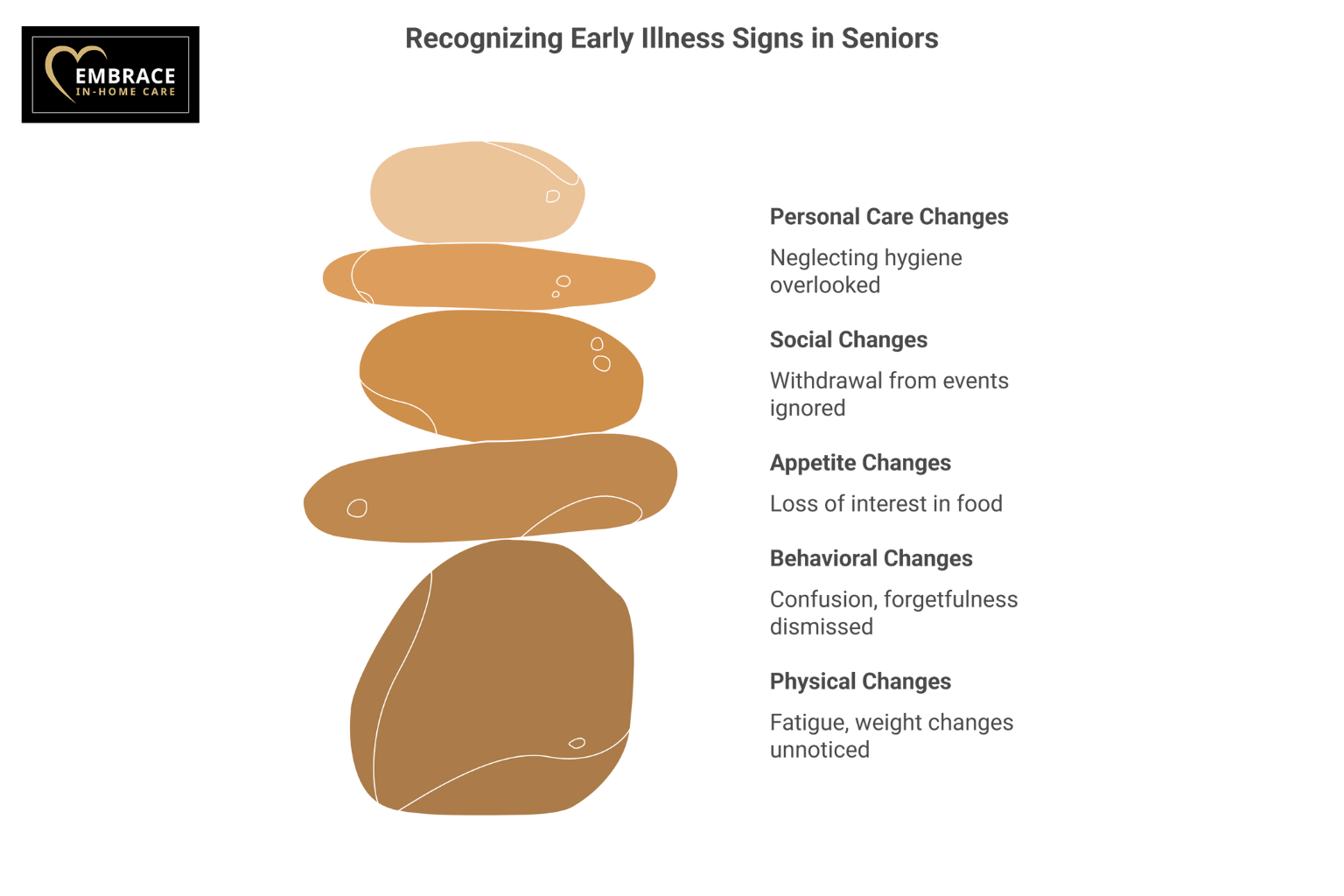Table of Content
Recognizing the early warning signs of illness in an aging family member can make a significant difference in his or her health outcomes and quality of life. Being attentive to subtle changes in behavior, physical appearance, and daily routines can ensure timely medical intervention when needed.
Changes in Physical Appearance and Energy Levels
Physical changes often provide the first clues that something may be wrong with your loved one’s health. Watch for noticeable shifts in your loved one’s appearance or energy that persist over several days or weeks.
Key physical warning signs include:
- Unexplained weight loss or gain
- Changes in skin color or complexion
- Persistent fatigue or unusual lack of energy
- Difficulty with balance or coordination
- Changes in posture or gait
- Frequent complaints of pain or discomfort
- Shortness of breath during normal activities
Pay particular attention to changes in sleep patterns, as disrupted sleep can indicate various health issues. If your loved one is sleeping significantly more or less than usual or experiencing frequent nighttime awakenings these could signal underlying medical concerns.
Seniors can face a variety of challenges as they age, many of which can be mitigated with the help of professional in-home caregivers who provide high-quality at-home care. Trust Embrace In-Home Care to help your elderly loved one age in place safely and comfortably.
Behavioral and Cognitive Changes
Subtle shifts in behavior and thinking patterns can indicate developing health issues, particularly neurological or mental health conditions. These changes may be gradual and easy to dismiss initially, but recognizing them early is crucial.
Watch for these behavioral indicators:
- Increased confusion or forgetfulness beyond normal aging
- Difficulty following conversations or finding words
- Changes in judgment or decision-making abilities
- Withdrawal from social activities or hobbies
- Increased irritability or mood swings
- Difficulty managing familiar tasks like cooking or driving
- Problems with basic financial management, such as unpaid bills or unusual purchases
As noted in financial management concerns, confusion about previously understood concepts like balancing a checkbook or falling victim to scams can be early indicators of cognitive decline that require immediate attention.
Appetite and Eating Pattern Changes
Changes in eating habits and appetite can signal various health issues, from depression to serious medical conditions. Monitor your loved one’s relationship with food and eating patterns.
Concerning changes include:
- Significant loss of appetite or interest in food
- Difficulty chewing or swallowing
- Complaints about food tasting different
- Skipping meals or forgetting to eat
- Unusual food cravings or aversions
- Weight fluctuations without dietary changes
- Difficulty using utensils or feeding him or herself
These changes may indicate dental problems, medication side effects, depression, or more serious conditions that require medical evaluation.
If your senior loved one needs help managing an illness or assistance with daily tasks, make sure you choose a top-rated provider of in-home care. Green Valley Embrace In-Home Care is here to help your loved one live a happier and healthier life in the golden years.
Social and Communication Changes
How your loved one interacts with others and communicates can reveal important health information. Changes in social behavior often accompany various illnesses and conditions.
Monitor these social indicators:
- Withdrawal from family gatherings or social events
- Difficulty maintaining relationships
- Changes in communication patterns or speech
- Increased dependency on others for daily tasks
- Loss of interest in previously enjoyed activities
- Confusion about familiar people or places
- Difficulty following social cues or conversations
Communication changes might include speaking more slowly, having difficulty finding words, or repeating questions frequently. These signs warrant professional evaluation to determine underlying causes.
Personal Care and Hygiene Changes
Decreased attention to personal care and hygiene often indicates health issues that affect motivation, memory, or physical ability. These changes can be sensitive to discuss but are important indicators of your loved one’s wellbeing.
Watch for:
- Neglecting personal hygiene or grooming
- Wearing dirty or inappropriate clothing
- Forgetting to take medications
- Difficulty with basic self-care tasks
- Changes in bathroom habits or incontinence
- Neglecting home maintenance or cleanliness
- Forgetting important appointments or commitments
These changes may indicate depression, cognitive decline, physical limitations, or other health conditions that require medical attention and support.
If your aging loved one needs occasional help with bathing, grooming, cooking, or other basic household tasks, or if you need time to attend to important personal matters, reach out to Embrace In-Home Care, a leading provider of respite care. Green Valley seniors can maintain their independence while living at home with the help of our reliable home caregivers. Call one of our friendly Care Managers today to schedule a free consultation.

